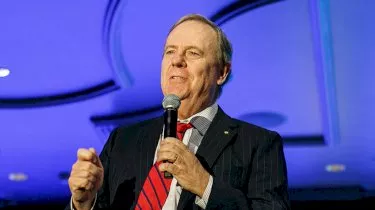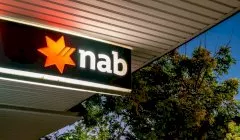Invest
What would a 0.75% cash rate realistically mean?
A majority of Australia’s economic experts predict the Reserve Bank of Australia (RBA) to cut the cash rate this afternoon – for the third time in 2019 – but what would actually be the effect of the rate dipping below 1 per cent? Peter Costello has weighed in.
What would a 0.75% cash rate realistically mean?
A majority of Australia’s economic experts predict the Reserve Bank of Australia (RBA) to cut the cash rate this afternoon – for the third time in 2019 – but what would actually be the effect of the rate dipping below 1 per cent? Peter Costello has weighed in.

The latest cash rate survey from Finder has more than half (55 per cent) of the 45 experts and economists surveyed expecting an October drop to 0.75 of a percentage point.
It’s a similar position to that taken by former government treasurer Peter Costello, who has even predicted that an immediate rate cut this month “may not be the end” of the downward spiral.
With “a bit of a race to have the lowest exchange rate at the moment” and to stay competitive among other stalling economies, it has begged the question for Mr Costello: What will a rate cut do for the economy?
In his view, not much.

The real economy
“We’ve already got a cash rate of 1 per cent. Suppose it goes to 0.75, suppose it goes to 0.5, [and we’ve got] all these people that are holding off spending or borrowing or investing,” he said.
“Do you hear anyone saying, ‘I wouldn’t have done it at 1 per cent, but I’m going out there now that it’s 0.75’?
“I don’t think so.”
Even outside the cash rate, Mr Costello looked to the real economy as it currently stands.
“You can get a home mortgage with a three in front of it,” he said.
“Take 25 basis points off – is it going to make a big difference? I don’t think so.
“It’s also what we call the law of diminishing returns – every rate cut brings a little less of a return than the one before it.”
The chairman of Australia’s Future Fund and the Nine Network corporation brought up the RBA’s comments about non-conventional monetary policy as evidence that there’s discourse around what happens “when you can’t cut any further”.
“That’s uncharted waters for us.”
Despite this, he was quick to then point out that “it’s not uncharted for the world”, singling out instances in the US and Europe.
“Would a rate cut do that much?” he repeated, before saying that it wouldn’t.
“It might keep your exchange rate competitive”, he did acknowledge, before conceding “it’s about the most you can hope for”.
The markets
Despite the lack of an effect Mr Costello perceived around the “real economy”, he did express that another rate cut would have an impact on the markets.
“I think it would support the markets,” he said.
“Markets are high because money is cheap, and every time money looks like it’s getting a bit more expensive, the markets start getting volatile… So, it might be good for the markets, but you should always bear this in mind: one day things might go back to normal and when they do, what’s going to happen on those markets.
“That’s what you’ve got to think.
“What’s the time frame on those markets going back to normal?”
He highlighted it as another reason interest rates are staying so low, explaining that “every time it looks like they are going to normalise and go up, the markets go haywire and people say, ‘Oh, we don’t want that to happen’”.
“The thing about easy money [is] it’s like the Hotel California. You can check out, but you can never leave,” he said.
“So, monetary policy won’t really do much.”
About the author

About the author


Spending
Household Spending Pops, Rate Hike Looms: A CFO Playbook from an Australian Retail Case
Fresh ABS data shows household outlays running hotter than expected, particularly in services—stoking calls for an RBA move as early as February. For operators, the macro headline is simple; the ...Read more

Spending
State Street economist comments on softer-than-expected CPI data
In light of the latest Consumer Price Index (CPI) data release, Krishna Bhimavarapu, APAC Economist at State Street Investment Management, has provided insight into the implications for the Australian ...Read more

Spending
Moneysmart study reveals Gen Z women more concerned about finances than men
A new research conducted by ASIC’s Moneysmart has unveiled the heightened levels of stress and concern regarding finances and the cost of living among Australian Gen Z women compared to their male ...Read more

Spending
The cost of politeness: Aussies out of pocket by $1,350 due to 'awkward tax'
It's the time of year when Australians dive into their pockets for festive events and gatherings, yet a recent study by PayPal suggests that many are too polite, or perhaps too embarrassed, to ask for ...Read more

Spending
Aussies can ‘NAB Now Pay Later’ with the last major bank to embrace BNPL
NAB has become the latest bank to enter the BNPL market. Read more

Spending
Aussie households spent $368 a week on transport after petrol price surge
Fuel costs have increased by 40 per cent over the past year, a new report from the Australian Automobile Association has revealed. Read more

Spending
Voters say reducing the cost of living should be the government’s top priority
Aussies have ranked high cost of living as the top issue that needs to be addressed by the next government. Read more

Spending
Bodies back Labor’s commitment to stronger BNPL regulation
All parties should commit to stronger regulations for the BNPL sector, according to Financial Counselling Australia. Read more

Spending
Household Spending Pops, Rate Hike Looms: A CFO Playbook from an Australian Retail Case
Fresh ABS data shows household outlays running hotter than expected, particularly in services—stoking calls for an RBA move as early as February. For operators, the macro headline is simple; the ...Read more

Spending
State Street economist comments on softer-than-expected CPI data
In light of the latest Consumer Price Index (CPI) data release, Krishna Bhimavarapu, APAC Economist at State Street Investment Management, has provided insight into the implications for the Australian ...Read more

Spending
Moneysmart study reveals Gen Z women more concerned about finances than men
A new research conducted by ASIC’s Moneysmart has unveiled the heightened levels of stress and concern regarding finances and the cost of living among Australian Gen Z women compared to their male ...Read more

Spending
The cost of politeness: Aussies out of pocket by $1,350 due to 'awkward tax'
It's the time of year when Australians dive into their pockets for festive events and gatherings, yet a recent study by PayPal suggests that many are too polite, or perhaps too embarrassed, to ask for ...Read more

Spending
Aussies can ‘NAB Now Pay Later’ with the last major bank to embrace BNPL
NAB has become the latest bank to enter the BNPL market. Read more

Spending
Aussie households spent $368 a week on transport after petrol price surge
Fuel costs have increased by 40 per cent over the past year, a new report from the Australian Automobile Association has revealed. Read more

Spending
Voters say reducing the cost of living should be the government’s top priority
Aussies have ranked high cost of living as the top issue that needs to be addressed by the next government. Read more

Spending
Bodies back Labor’s commitment to stronger BNPL regulation
All parties should commit to stronger regulations for the BNPL sector, according to Financial Counselling Australia. Read more








